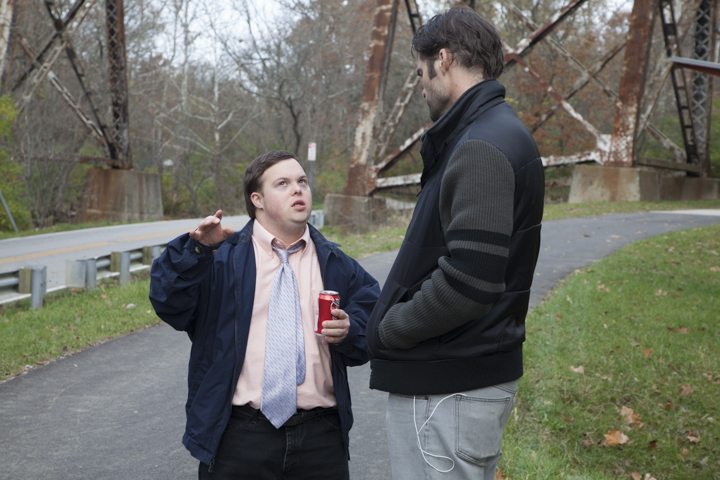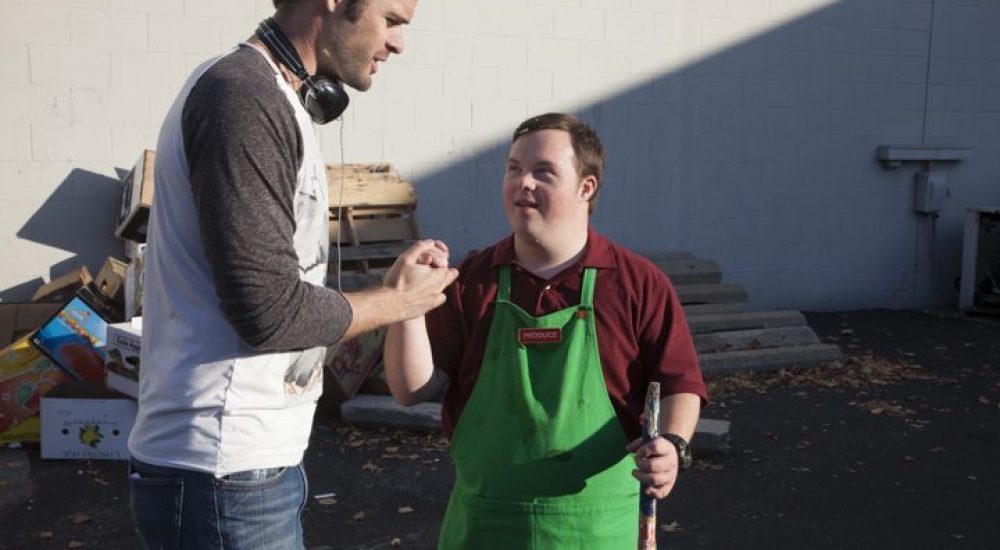BOOST Breakfast Club Blogger Kristin Stayer had the pleasure of interviewing Chris Dowling, Writer/Director for the movie Where Hope Grows, which comes out in theatres on May 15.
The Synopsis
Calvin Campbell is a former professional baseball player sent to an early retirement due to his panic attacks at the plate. Even though he had all the talent for the big leagues, he struggles with the curveballs life has thrown him. Today, he mindlessly sleepwalks through his days and the challenge of raising his teenager daughter. His life is in a slow downward spiral when it is suddenly awakened and invigorated by the most unlikely person – Produce, a young-man with Down Syndrome who works at the local grocery store.
Calvin slowly loses the chip on his shoulder as he begins to experience the world through Produce’s eyes. Faith, work, purpose and most importantly family, blossom into Calvin’s life as their friendship develops. The unlikely pair becomes intertwined giving Calvin’s life new meaning and purpose, but unfortunately leads to tragedy due to single decision echoed from Calvin’s past.
Where Hope Grows is a story of finding redemption through faith, hope and love. This movie will be released in theatres on May 15 and BOOST Conference attendees will be able to experience the trailer at the Opening & General Session and stop by the Where Hope Grows booth and visit with the team in the Exhibit Hall.
1) What new perspectives do you hope people have after they watch the movie?
In a funny way, it’s art imitating life or life imitating art, whichever way you want to put it because I didn’t have much experience or any experience really with Down syndrome going into this movie. As the character of Calvin kind of goes on his journey and gets to know the character of Produce, I also was going on a journey of getting to know David. I learned a lot. Our society is stuck and inundated in these old stereotypes of people with special needs. I want people to go see this movie and see that someone with special needs isn’t written off as a burden and it’s not a group but honestly someone with special needs is an individual.
David is David and what he does on screen is amazing and it just so happens that he has Down syndrome. I hope that the audience sees how much potential individuals with special needs have and what each individual is capable of…and what special needs is and most importantly what it is not.
2) Had you ever worked with someone with Down syndrome before doing this movie?
No, I had not. On my first trip to meet David I was headed to Kentucky to meet him. My wife and others suggested I read all these books and do research on Down syndrome and honestly I said I am just going to go in there and treat him like a dude and just see what happens and for plan b I’ll do quick research if it’s not working. It worked. I went in there and David was super cool and ready to work hard. We tore it up and became good friends and trusted each other and so again, I think it is about the individual.
3) What was the greatest lesson you learned from working with David DeSanctis?
As I go to know David, there were so many times that I thought he wouldn’t be able to handle certain things. He would continually prove me wrong. When I first met him, I had the script in my hand and I looked at it and looked at David and I said, “Can you read all this?” I didn’t even know. He looked at me and said, “Dowling,” and he licked his finger and flew through it and had it highlighted and knew everything. He was awesome.
Through the whole process David gave me performances that were continually surprising. Since then I have met so many individuals with special needs at screenings and through our conversations. You know, come to realize, they are each individuals and have things that make them tick. I just think that people in general, and myself included, just don’t have experience with special needs and don’t know what to expect. Hopefully, with our movie you will see that the character of Produce is more alike you and me than different.
4) What do you think people may most misunderstand about people with special needs?
I think it’s the limitations. Obviously there is a wide spectrum and for example, David is high functioning. I think we tend to think that they are going to be a burden on society, a burden on life, that they can’t accomplish anything, or that they won’t be happy in life and it’s just wrong. In Where Hope Grows, that’s a big part of it. Calvin thinks this kid is not smart enough to realize that he’s missing out on all the good things in life.
I recently saw a poll that surveyed adults with Down syndrome and they asked them how many are happy with their lives and above 90% responded that they were happy with their life. Tell me another cross section of adults in the world that would result in 90% saying they were happy in life. You’re not going to find it. So, yes, someone with special needs can live a happy and fulfilling life. It’s about opening your eyes and getting to know someone.
5) What stereotypes about special needs do you hope to shatter for educators with this movie?
Again, there’s a wide spectrum of functionality and you can’t lump them all together. David for example took regular classes at his high school. It’s so easy to label someone and put them in a box and I don’t think kids operate that way. Don’t limit them just because you think they are limited. Let them show you what they can do. Don’t be afraid to push them. With David, I pushed him a lot. I pushed him to be better and do things and I didn’t give him a break just because he has Down syndrome. He responded to it and so with educators, you can’t limit students because they have special needs.
6) What can educators do to be activists and advocates for people with disabilities and special needs?
Inclusion. Finding ways to make them included with students. There’s a really cool group out of Fresno, CA called Break the Barriers and the whole premises is inclusion. In all of their classes they welcome any kind of people with disabilities and kids who do not have disabilities and mesh them together. They learn together, become friends, and they realize they are more alike than different. I think that’s how you shatter stereotypes, whether it’s racial, religious or whatever. It is that introduction of each other and working to make everyone feel included instead of excluded.
I also suggest that you introduce children at a young age. My daughters now know David and are comfortable and as they see other kids with special needs, it’s not some weird, mysterious thing. They simply see that person as another kid and that is now a part of who they are.
7) What are some creative ways to empower students with special needs?
One way would be through media. When I met David on the first day, he told me how much he likes to make playlists, so I had him make a playlist for his character Produce. Then we went through every single scene in the film and I had him write down a song from the playlist that made him feel the scene. When we were shooting and something was not right or he wasn’t feeling it, I would have the song David chose played and the whole cast and crew would break out in a dance party.
He would reconnect and it would reset him to be ready to act. That was something David loved because it’s who he is as an individual. Every person has something that makes them tick from those who have no intellectual disabilities to those who have ADD to kids who just need love. Kids are kids and they want to be treated as such. David now sends me CD’s of playlists all the time that he makes. I love them.

7) How have you been changed?
I had no experience with special needs or Down syndrome. It definitely wasn’t a passion of mine, not that I wasn’t compassionate about it, it just wasn’t on my radar and now it absolutely is. I think it’s important to go out there and shatter stereotypes because I just assumed you just kind of let those with special needs do their thing and they are this subgroup because they really can’t do much. I have learned that individuals with Down syndrome are so loving. It legitimately opened my eyes and in turn opened up my family’s eyes and hopefully through the movie, opens up the eyes of a broad audience.
I really look at it in two ways. You look at David, the actor and then there’s Produce, the character. When you are watching the movie, you see what Produce does and the character that Produce is and right then and there that’s enough that you go, “wow,” it completely changes my perspective of what Down syndrome is, just strictly by the character. But then when you peel back the layer then you realize it’s David, a real human being with Down syndrome, that was able to accomplish all of this and beautifully portray something and ingest all this material to create it and make it his own. It’s bigger than just the character, there’s an actual human being behind it. That’s impressive and I don’t want that to get lost on people. David is acting, he’s not just being himself on screen.
8) What is something that you want people to know before watching this movie?
If you want to see other films like this, we have to prove to Hollywood that there is an audience for this. It’s extremely important for people to go to the box office and tell their friends to go or else this whole thing goes away. We really took a chance. The studio would have hired someone who did not have Down syndrome to play special needs because they would assume that an individual with Down syndrome could not do it. We said, we’re going to prove them wrong by hiring an actor with Down syndrome and we did it. It’s a good cause and you are going to see a good movie and like it. We poured our heart into it and we are really excited it and people are really supporting the film.
9) What are you up to next?
I am producing a documentary called Asperger’s Are Us and they claim to be the only comedy troupe in America where all the performers are on the Autism spectrum. We are finishing the final cut of it and it will be out in a few months. It’s solid. Very excited to get it out there.
Follow updates on the movie on Facebook, Twitter, and their website.
No one likes to be stereotyped. Be a part of the solution and send this powerful video with your friends.
For breakfast, Chris had a mixture Kashi Go Lean Crunch and Cocoa Pebbles cereal.
